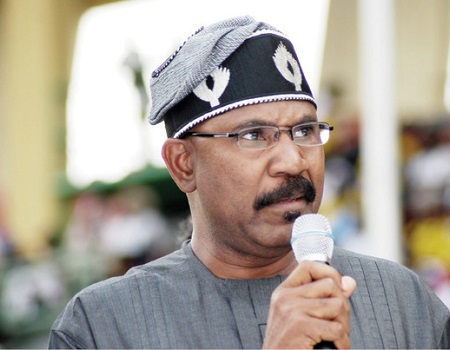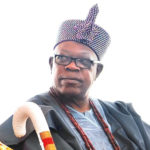The Federal Government has launched the National Eye Health Policy and inaugurated National Eye Health Committee to ensure equitable access to quality eye care services which can strengthen Nigeria’s health system towards the achievement of universal eye health as a part of universal health coverage in Nigeria.
The National Eye Health policy is Nigeria’s first comprehensive National Eye Health Policy which scales up existing eye health services and ensures that no one is left behind through approaches that ensure equitable access to quality eye care services.
It was gathered that this document has been adopted by the States and the Federal Capital Territory during the 64th meeting of the National Council on Health and it was believed that with this launch, adoption of the policy in the various states will begin.
The Minister of State for Health, Dr Olorunimbe Mamora, at the launch, on Thursday, in Abuja reiterated the importance of vision to the socio-economic development of the people.
Mamora disclosed that Nigeria with other member states at the United Nations General Assembly recently adopted the vision for everyone which formed accelerating action to achieve the sustainable development goals resolution, aimed at committing the international community to eye health for the 1.1 billion people living with preventable sight loss by 2030.
ALSO READ FROM NIGERIAN TRIBUNE
- Three Teenagers In Police Net For Killing Friend’s Lover For Ritual
- LAGOS-IBADAN EXPRESSWAY KIDNAPPING: Fulani Herdsmen Shot Driver In The Head, I Escaped While They Slept —Youth Corps Member
“It thus enshrines eye health as part of the UN Sustainable Development Goals. Evidence has shown that individuals with impaired vision have difficulty with performance of daily tasks, inability to fend for themselves thus lowering their productivity and consequently reducing their contribution to the economic growth of the nation.”
Mamora further maintained that It has been established that the avoidance of blindness is key to the achievement of Sustainable Development Goals (SDG 1; no poverty) as vision loss alone costs the globe a whopping $411 billion annually.
According to Mamora, “following successful cataract surgery, the income bracket of 46 per cent of households moved up the economic ladder thus contributing to eliminating the zero hunger in SDG 1.
“This document directs the policy thrusts of the government and shows how it intends to ensure that Nigerians have a country where no one is needlessly blind.
“Thus enshrining this document as part of our governance structure ensures that the majority of Nigerians have the potential to reduce the burden of blindness which would ultimately lead to an increase in the Gross Domestic Product (GDP) and further enhance the economic growth of this great nation.
“The document further puts in place a framework for best practices and enhances competence-based leadership in all strata of eye health encompassing optical, optometric, medical and surgical ophthalmology as well as allied health services.
“It also aims at ensuring that there is patient-centred inclusive eye health where access to quality eye care at the primary, secondary and tertiary levels of eye care without neglecting the rehabilitation of those who are already irreversibly blind.
“It scales up quality systems through optimization of the referral system within the healthcare industry and also facilitates inter-sectorial collaboration with relevant stakeholders like Ministries of Education, Transport, Women affairs.
“Humanitarian affairs, disaster management and social development as they play a critical role in ensuring that Nigerians have increased access to quality eye care services.”
Mamora also pointed out that in a country like Nigeria with a prevalence of 0.78% for blindness with women and the elderly affected the most, Eight four per cent (84%) of these blinding diseases are avoidable with possible causes like cataract, glaucoma, refractive errors, uncorrected aphakia, harmful traditional eye practices, corneal opacities and NTDs like trachoma and onchocerciasis.
“Lack of awareness and inaccessibility of eye care services are possible reasons why many Nigerians still remain visually impaired.
“The document reduces this barrier by ensuring that there is a framework to strengthen and support the healthcare facilities and also reduces inequality in accessing eye health services with no attendant financial risk to the populace and ultimately ensuring equity in the provision of eye care services.
“Partnerships with key stakeholders is one of the priority areas of the National Eye Health policy. This is because we believe that partnership with relevant Ministries, Departments and donor Agencies like Sight Savers helps to ensure that policies made affect the lives of the common Nigerians in such a way that achieving the Sustainable
Development Goals becomes imperative for us.
“The partnership with the Ministry of Education through the school eye programme which this document promotes will ensure that our children get quality education thus facilitating the achievement of SDG 4 as simple use of glasses for refractive errors reduces the odds of failing exams by 44 per cent.
“Furthermore, intersectoral collaboration with Ministry of Women Affairs and Federal Road Safety Corps(FRSC) will reduce gender inequality and ensure sustainable cities through the reduction in road traffic crashes thus achieving SDGs 5 and 11 respectively.
“This ultimately buttresses the need for this document at a point like this in the history of our great country Nigeria.
“The National Eye Health Committee is a vital part of the governance structure in eye health care services as it is expected that the members will come up with policies that will help to enshrine eye health services in the country that ensures that no Nigerian is needlessly blind.
“Your inauguration today is a clarion call to service to our fatherland and also an opportunity for you to contribute your quota to national development as the policies and the decisions that you will take will go a long way to ensure that quality eye care services get to the nooks and crannies of this country.
“These policies will also lay the foundation for best eye care practices in Nigeria and also ensure that even generations yet unborn will enjoy the dividends of the efforts that you will put in today.
“I commend and implore you to see this onerous task as a call to duty for which you have been chosen amongst the millions of ably qualified Nigerians to deliver on this mandate.






